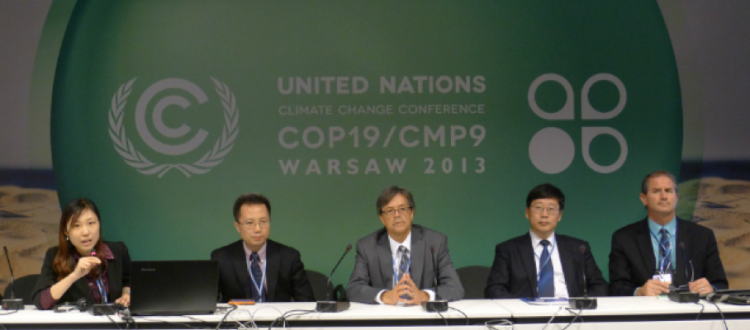COP 19 Side Event: Facilitating US-China Climate Cooperation
WARSAW (Nov. 19, 2013) – As part of the UNFCCC COP19 climate change talks held in the Polish capital Warsaw, Global Environmental Institute (GEI) and the U.S. Center for Climate Strategies (CCS) jointly held an official side event: “Achievement and Experience Sharing: China-U.S. EcoPartnership for Subnational Low-carbon Development Planning.”
Themed off the bilateral partnership between GEI and CCS, the side event aimed to further facilitate China-US climate cooperation, under a broader context for furthering global climate cooperation and exchange.


GEI team with representatives from CCS (top) and the side-event venue (bottom) – GEI 2013
California Environmental Protection Agency Secretary Matt Rodriguez gave a speech as part of the event, in which he introduced the Memorandum of Understanding between the Governments of Guangdong and Jiangsu Province and the State of California. Secretary Rodriguez also highlighted exchanges and cooperation in areas such as clean energy technology, and provided an in-depth analysis of the experiences and challenges of China-US sub-national cooperation.
GEI Climate Change Program Officer Yu Qingchan chaired the event, and presented a video to exhibit the course and main outcomes of GEI and CCS joining the China-US EcoPartnership Program.
 GEI’s YU Qingchan (L) leads the panelists into discussions at the COP19 side event – GEI 2013
GEI’s YU Qingchan (L) leads the panelists into discussions at the COP19 side event – GEI 2013
The aim of GEI and CCS’ cooperation project is to provide local governments with quantitative tools for analyzing policies in terms of their costs, benefits and regional macroeconomic impacts, for the dual goals of achieving economic development and energy conservation. CCS’ President and CEO, Thomas Peterson, provided a detailed introduction of the tools’ methodologies and cases of application in the U.S.
Deputy Director of the Chinese Academy of Science Institute of Policy and Management (CAS-IPM), Wang Yi, also spoke as part of the event and introduced the technological achievements of the cooperation project.
- The fundamentals of the Chinese provincial low carbon planning tool have been completed, including an industrial greenhouse gas (GHG) emissions inventory and emissions trend forecasting, emissions reduction measurement and cost analysis of low-carbon policy, and the policy’s macroeconomic impact assessment. The set of tools have already been used to analyze the low carbon development policies in the City of Chongqing’s 12th five-year plan, and to assess the regional economic impacts of Guangdong Province’s carbon trading scheme.
Director of the Chinese National Climate Strategy Center for Strategic Planning, Liu Qiang, introduced the main challenges and obstacles China is currently faced with in the areas of energy conservation and emissions reduction, and emphasized the important role of the provincial low-carbon planning tools in supporting China to achieve low-carbon development.
- Director Liu also stated his beliefs about the main problems currently facing China, including the selection dilemma local governments face between economic growth and energy saving and emissions reduction, the funding, organizational and technical capacity of government organizations, the structural adjustment of industry as part of the industrialization process, green and low-carbon transformation as part of the urbanization process, as well as differences in regional development. Director Liu also highlighted how the development and promotion of these types of tools provides a scientific and effective way to address these problems.
In the final discussion session, participants exchanged ideas with Chinese and American experts on the outlook of China’s renewable energy market, when China’s carbon emissions will reach their peak, as well as issues such as carbon trading prices.
Deputy Director of CAS-IPM, Wang Yi, specifically raised the fact that costs should be fully considered when discussing the issue of China’s peak emissions and in particular whether implementation costs are acceptable. He also focused on the importance of selecting the right path to reach peak emissions, since different implementation paths will have different effects on the environment and economic development, a question that requires urgent and in depth attention.
In addition, GEI also revealed an upcoming collaboration with CCS, CAS-IPM and the Tianjin Administration Institute, to prepare low-carbon planning training materials and online courses. This platform will be used to launch extensive technical training and promote the use of the low-carbon development tools, in order to assist various provincial and municipal governments to develop more effective and integrated low-carbon policies and carry out low-carbon policy evaluation work.

